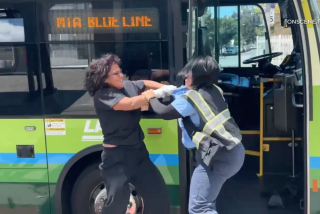Union, OCTA say bus strike to end
- Share via
Negotiators for the Orange County Transit Authority and its bus drivers signed a tentative settlement Saturday that will end the week-long strike and could put most buses back on the road by midweek.
The strike, which has left the system’s 225,000 daily riders scrambling for alternate transportation, was entering its second week when OCTA officials announced the agreement at a 9 a.m. news conference.
“This deal provides a very generous wage and benefits increase for all of our coach operators,” OCTA Chairwoman Carolyn Cavecche said.
The proposed contract represents an $18.2-million increase from the previous one, giving raises of 10.8% to entry-level drivers and 11.7% to drivers with five or more years of experience over the next three years.
“We’re not going to keep members out on strike any longer and inconvenience the riders,” said Patrick D. Kelly, secretary-treasurer for Teamsters Local 952. “They [the OCTA] moved enough for us to settle.”
Drivers were still picketing late Saturday, but stopped when negotiators signed off on the agreement.
Union members and the OCTA board still have to ratify the agreement before it takes effect. The union will be voting on the contract today, and the OCTA has called a special board meeting to ratify it Monday morning, officials said.
It could then take several days for the transit agency to restore full service, they said.
The proposed contract represents a compromise, because though it gives all drivers raises, it provides slightly higher increases for more experienced drivers. That had been a sticking point between the union and the OCTA, with the agency arguing for distribution of the raises evenly among its 1,100 drivers to make it easier to recruit new employees, while the union favored larger raises for senior drivers to repay them for taking a smaller share in previous contracts.
The actual increase in wages and benefits negotiated since the union walked out more than a week ago amounted to an increase of one-tenth of 1% -- only $200,000 more than OCTA had offered before the strike began.
“This is a strike that didn’t have to happen,” Cavecche said. “Our coach operators have lost over $1 million in wages, and our riders have had a huge economic burden placed on them.”
But union officials defended the strike, saying it had achieved significant improvements in its members’ health insurance plans, pensions and wages.
“It wasn’t just about money,” Kelly said. “A lot of our people are very, very angry at the authority over working conditions and attitude.... They weren’t taking us seriously. They just took us for granted until we started making noise.”
The OCTA said it ranks 12th in the nation in ridership, with 68.5 million passengers annually. The agency operates about 460 buses at any given time, with a total fleet of about 900.
Once the agreement is finalized, the agency will start running buses on the most heavily traveled corridors, Cavecche said. “If I could turn-key it at noon on Monday, I would,” she said. “But the logistics of getting an operation of this size up and running are enormous.”
The striking drivers must first be formally notified that the strike is over. Then maintenance workers, who have not crossed picket lines, must maintain, fuel and, in some cases, move the buses into position.
Carol Murdock, a 27-year bus driver from Riverside, said she planned to vote for the contract because the $2.50-an-hour raise she would see over three years is a more attractive prospect than continuing to lose money in a drawn-out strike.
“Every week I’m out, I lose about $1,000,” she said. “If we stay out another week, I suspect we’ll lose people crossing the lines.”
The county’s bus-dependent population, much of it low-income, was still feeling the squeeze of no service this weekend. But the prospect of bringing back buses sometime this week brought hope to many.
“It will literally be a lifesaver,” said Jane Reifer, spokeswoman for Transit Advocates of Orange County, who said the experience over the last week has made her want to see a system in place that would prevent such a strike. “One side doesn’t get to negotiate, and that’s bus riders.”
For Cesar Cortes, 36, the news couldn’t have come soon enough. Since the strike began, the Costa Mesa produce clerk said, he has left his house at 4 each morning lugging his dress clothes and nice shoes in a backpack so he wouldn’t arrive at work sweaty and blistered from the hour-long walk.
Cortes considers himself lucky; some of his friends lost their jobs because they had no way to get to work, he said.
“I’m willing to pay 10 cents more -- just give us the service back,” he said, waiting for a rare bus to take him back from after-work shopping in Santa Ana. “I should be home right now.”
More to Read
Sign up for Essential California
The most important California stories and recommendations in your inbox every morning.
You may occasionally receive promotional content from the Los Angeles Times.











